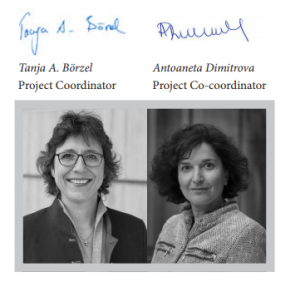Our first EU-STRAT newsletter in 2019 is ready!
Click here to download it now.
Curious about what will you find inside?
Let’s see what project coordinators – Tanja A. Börzel and Antoaneta Dimitrova – wrote about this issue in the editorial:
“Dear friends and colleagues,
We hope you’ve had a great start to 2019. The past months have brought plenty of publications and events to fill you in on. And while the new year has just begun, we are looking at the final stage of EU-STRAT.
Back in November, our partner institute in Kyiv, the Ukrainian Institute for Public Policy, hosted a policy briefing on the political economy of EU legislation harmonization. We’ll take a look at the EU-STRAT findings that were presented as well as the discussions that took place between our consortium members and participants largely from Kyiv’s research and business community. The impact of the EU Association Agreements and Deep and Comprehensive Free Trade Area (DCFTAs) on Ukraine, Georgia, and Moldova has left plenty to discuss.
Our latest policy comment, featured in this issue, sheds light on recent developments in Armenia stemming from the Velvet Revolution. The parliamentary elections held in December 2018 have confirmed overwhelming public support for the revolution movement, but what is the actual scope and depth of these changes? Our authors examine the reforms that are already underway, what’s still needed, and how this impacts relations in the neighbourhood.

Our research on the strategies of external actors in the Eastern neighbourhood has featured in several working papers released in the last months. While the EU and Russia are known players in the Eastern Partnership countries, EU-STRAT set out to examine the role of other actors in this region as well. Accordingly, we present in this edition a glimpse into the papers examining the approach of China, Turkey, and the international financial institutions, such as the International Monetary Fund and the World Bank. This research has important implications for how the EU could potentially work with other external actors that might not always share the goal of keeping EaP countries on the path of transformation towards greater political and economic access. As the final piece in this edition’s ‘EU-STRAT at Work’, we also share a report from our St. Gallen team’s workshop in Bucharest on the interdependencies of different secessionist conflicts. (…)”
PS. Dont forget to mark your calendars! Our final conference is scheduled to take place in the Wijnhaven Building of Leiden University (Turfmarkt 99 2511 DP, The Hague, NL) on 11-12 April 2019. The conference will take a look at our most recent research on, to name just a few of the topics, the link between domestic regimes and interdependencies, the susceptibility of domestic actors to external actors’ strategies, and scenarios of potential opening or closure in Moldova, Belarus, and Ukraine. We’ll keep you in the loop as more details are finalized – don’t forget to check our Facebook page (EU-STRAT) and Twitter (@eu_strat)!

